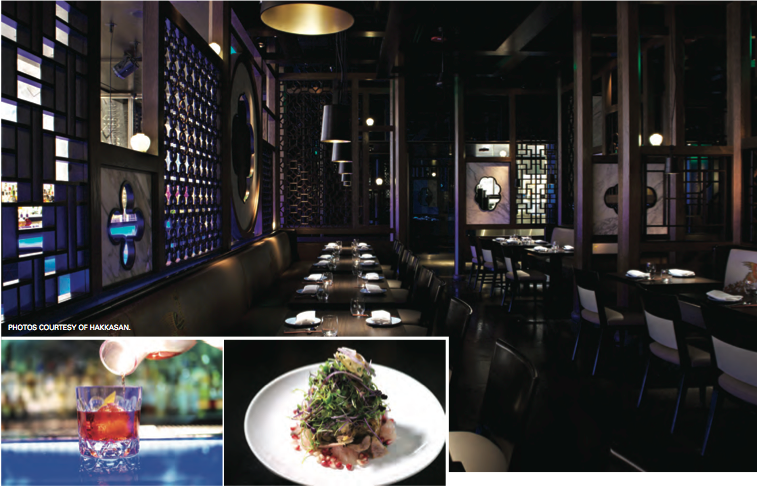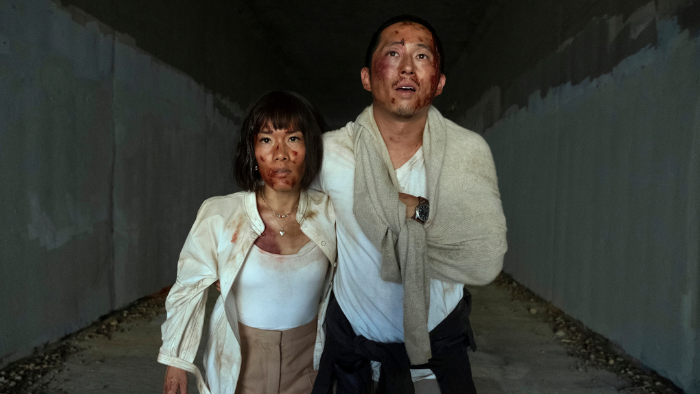Chasing Roy
The Ever-Busy Acclaimed Chef Roy Choi Talks About His New Book, a Revealing Memoir Interspersed with Recipes and Capturing the Flavors and Textures of L.A.
by HELIN JUNG
Roy Choi doesn’t sit still. He imbues a sense of propulsion. He is switching between the counter and the stove in the kitchen of a skyscraper, debating the merits of up-and-coming Korean rappers in the back seat of a taxi, getting up from a long table at dinner to step out into the cold and catch a breath, driving through Southern California while discussing his late-night writing regimen, running around the block just because he can.
You chase after Choi. You never quite feel like you’ve got him pinned down. The renowned Los Angeles chef—with already three restaurants and a fourth on the way, along with the Kogi taco truck and a community-based café venture in South L.A.—paused long enough to talk about the launch of his new book, L.A. Son: My Life, My City, My Food, co-written with Tien Nguyen and Natasha Phan. It is the story of his life told through stories and recipes—both wholly devourable, yet ultimately unsatisfying. The more you get of Choi, the more the appetite grows. Here’s a taste.
You used to write for KoreAm. Now you have a book. Tell me about your evolution as a writer.
Back then, I thought I was a writer, but I was horrible. I used too many metaphors. I was going through a lot of stuff, and I felt like I had a voice and I just had to get it out. With the book, I got leaner. It helped me to have a team of co-authors and an editor. I learned to be confident in the power of the message. Letting it breathe. To not describe every single drop of blood in the fight scene. To leave some of that to the imagination.
Are cooking and writing related for you?
My cooking probably looked like that writing when I was starting out. It was filled with tricks. Now it’s stripped down and really pure and honest and powerful. I can literally cook something with ketchup and rice, and it would be a million times better than if I had foie gras and truffles back then.
What’s changed?
What I’ve found is the glue. I know how to proportion correctly, pick the ingredients so they bounce off each other. I know how to get to the point.
Is the cooking stream-of-consciousness in the same way that the writing is?
My cooking lives in a very free world. I’m moving around a lot. I’m not just in one kitchen. I’m on the streets, I’m smelling things, I’m seeing things. I think there’s a power in that.
Tell me about what you’re seeing that inspires you.
The people walking on the street. Ladies pushing their babies in strollers. Headphones in the ear waiting at the bus stop. Carne asada and pupusas and Korean barbecue and cookies and billboards.
Stickers on lampposts. Aggression and happiness. Seeing people’s faces. The sky during the different times of day.
How does all that feed into food?
I’m bringing life to food. That’s what I’m doing. I’m bringing real, everyday life, everyday moments, small, small, nuanced. That life is what my food is right now. It’s all just one flowing thing.
What was the last dish that came out of this kind of inspiration?
Maybe the kung pao noodle. Chinatown. Lunch-special spots. Seeing old ladies sifting through the trash cans for plastic bottles. Seeing old men hanging out on benches. Young kids coming out of school. The history of Chinatown. My history of Chinatown. The way things are right now in L.A. The sun, how it sets over Chavez Ravine. The fading paint on the west side of the buildings of Chinatown. All those things, and then I came up with the kung pao noodle dish. I was trying to capture my vision of Chinatown at that moment.
Your parents figure prominently in the first part of the book. What is your relationship like with them now?
They’re very important to me—they’re my parents—but I still have a very complicated relationship with them. I can’t really express how much I love them, to them. We still fight and are closed off to each other. But we’re fighting over nothing.
 Choi’s parents, who immigrated to the U.S. in 1972.
Choi’s parents, who immigrated to the U.S. in 1972.
How old are they now?
My dad’s 73. My mom’s 67.
How have they absorbed your success?
It’s been a very difficult thing. I understand that what I do is a public endeavor. I appreciate the fact that my parents, my sister, my family, everyone is interested in the success of Kogi and what’s going on. As much as that is wonderful and I appreciate their love, it’s suffocating, too, for me. It’s my work. It’s like me playing ball and them being on the court with me. It’s really tough in that aspect. But I can’t complain about it because it’s a pretty fantastic situation I’m in. It’s just a weird ball of wax. I’m happy that they’re happy, but to be honest, I don’t care. It’s their decision to be happy or sad about what I’m doing, but I’m going to keep doing it.
I feel like you’re constantly working on yourself. What are you doing to improve yourself these days?
I’m running. Two miles every day. I was never a runner. That’s what I’m doing to improve myself holistically and physically.
Why running?
I don’t know. I just had a Forrest Gump moment. I’ve been doing it for about seven months now.
Are you losing weight?
I lost like 12 pounds. My head has cleared up.
What time of day do you do it?
I do it really early in the morning. Rocky mornings. Six a.m.
Was it hard to start?
That’s the hurdle I finally got over. I always thought running was hard. It was such an endeavor. But I decided to finally do it little by little and not feel like I was a schmuck if I couldn’t do it. I started with one block. Then I turned it into two blocks, then three blocks, then a mile, then a mile and a half, then two miles. I finally took the extent of it out of the picture. It didn’t mean anything if I only ran for so far.
Are you going to be running a marathon next year?
Nah. There’s no goal behind it. I just like running. It’s like my only hobby right now. I wake up, go out and run.
Have you sustained any injuries?
It’s not that intense. I’m running good.
Are we talking about a slow jog?
I’m running! I’m running like 40 minutes a day. Two and a half to three miles.
That sounds like a walk.
Isn’t that good? It’s better than nothing. I’m just out there jogging. Listening to hip-hop. Looking at the city go by. That’s all I’m doing.
This article was published in the December 2013 issue of KoreAm. Subscribe today! To purchase a single issue copy of the December issue, click the “Buy Now” button below. (U.S. customers only. Expect delivery in 5-7 business days)







